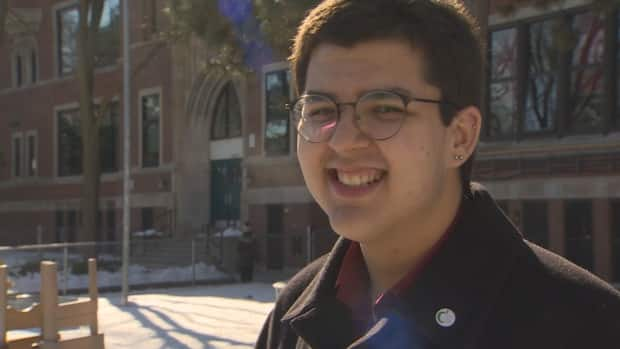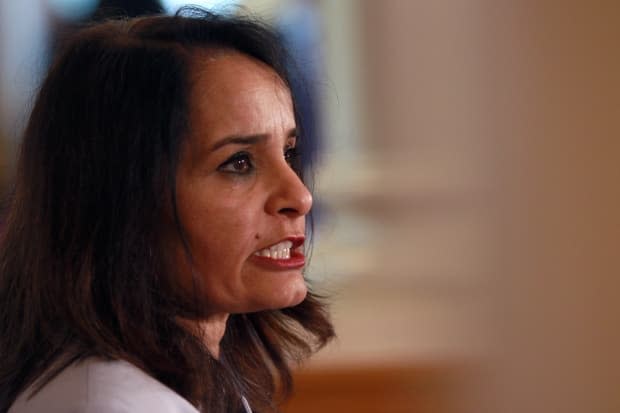As more high schools add Indigenous-focused compulsory courses, some warn against a siloed approach

As a Shakespeare fan who loves sharing his work with students, Windsor, Ont., English teacher Carolyn Howlett admits she felt a bit apprehensive when her board began work shifting its Grade 11 English course to focus solely on First Nations, Métis, and Inuit writers.
"I always say the reason why I teach is because of Shakespeare," said the Greater Essex County District School Board (GEDSB) teacher and department head of English at her school.
Just over five years later, however, she's convinced the decision is a good one. As of this past September, every GEDSB high school has made the transition.
"Literature, language, you can teach that with George Orwell or you can teach it with Richard Wagamese … Why not offer students a different perspective?" asked Howlett.
"This course actually helps students to be more aware of the world around them and their place in the world, in a very diverse community."
A growing number of Ontario school boards are making a similar switch to their Grade 11 English offering. Meanwhile, British Columbia's Indigenous-focused learning requirement for high schoolers to graduate starts next fall.
As students and educators continue to push for an education sector response to the Truth and Reconciliation Commission's calls to action, some are turning to compulsory Indigenous-focused courses as the way forward. Others warn against a silo mentality, where Indigenous voices, perspectives and knowledge appear only in certain subjects versus being woven throughout what students learn.
WATCH | More schools adding compulsory Indigenous-focused courses:
Studying Indigenous voices in a senior English course can pack a different, more empathy-inspiring punch than perhaps when students encounter similar topics in history class, says Howlett, who holds a history degree herself.

For instance, when her students read Richard Wagamese's novel Indian Horse — in which an Ojibway residential school survivor seeks escape in hockey — "they're reading that through a first-person narrative. It creates an empathy that you wouldn't get otherwise," noted Howlett, who began professional learning to prepare for the course before first teaching it in 2018 and has participated in reviews and updates in the years since.
Having taken the course (officially called Understanding Contemporary First Nations, Métis, and Inuit Voices) with Howlett last year, Grade 12 student Callie McRorie says it presents Indigenous voices in a natural way while keeping the same learning expectations of any other English class.
Reading Indigenous literature, "you can still dissect it. You can still work with it as you work with any other novel or piece — the only difference being it is written by an Indigenous person and you get that experience," she said.
"It opens up a whole new point of view and a whole new sense of critical thinking that people might not have gotten before from just the classics that your parents read."
Fellow Grade 12 student Taylor DeVries said the writers piqued her interest more than those of earlier English classes and opened her eyes to Indigenous perspectives.
"I was upset that I'd never been taught about this before," DeVries said, adding that during her grade school years, a lesson about residential schools had justified them.
"Hearing the complete opposite, like what it actually was like, hearing Indigenous voices of residential school survivors … I think it's essential for all kids, especially our age, to learn that."
'People will have to listen'
After spending about two years campaigning for the Toronto District School Board to switch to the Indigenous-focused Grade 11 English course, high school senior Isaiah Shafqat is happy trustees voted to do so last week.
"Indigenous histories are often hidden, [though] Indigenous people for years have protested, have shared our history," the Mi'kmaw teen, who is also the Indigenous student trustee for TDSB, said a day after the vote.

While Canadians haven't listened before, "now they are. And being the largest school board in Canada and having this course mandatory, people will have to listen and they'll have to learn."
Toronto joins a growing number of peers across Ontario who've made or are making the transition, from Thunder Bay Catholic District School Board, Lambton Kent District School Board and Ottawa-Carleton District School Board to, more recently, York Region District School Board and Durham District School Board.
Making the course compulsory is "a great opportunity for our students to have that learning that the vast majority of Canadians never had growing up," said TDSB chair and trustee Rachel Chernos Lin.
A similar desire to boost student awareness of Indigenous voices, perspectives and contributions informed B.C.'s introduction of an Indigenous-focused high school graduation requirement, according to Rachna Singh, B.C.'s minister of education and child care. The decision comes after consultation with and feedback from Indigenous communities, she said.
Starting next fall, B.C. students must complete at least four credits in "Indigenous-focused coursework" to graduate, with options including an existing selection of provincial literary and social studies courses, First Nations languages courses or classes developed locally by educators.

"It's important for our next generation to know about … our shared realities, our histories and especially what Indigenous communities have gone through and what they have to share with us," Singh told CBC News from Victoria.
"It is our commitment to truth and reconciliation … We cannot just do it with words. I think it needs to come with strong action items."
'Every aspect of a student's experience'
While happy to see greater inclusion of Indigenous voices, University of Manitoba professor Niigaan Sinclair is wary of limiting it to specific subjects.
"The problem with putting Indigenous perspectives only in … the social sciences or the humanities is that we frame Indigenous peoples often times as problems, as something to be solved," said Sinclair, who is head of the school's department of Indigenous studies.

"Science, phys ed, math — Indigenous knowledge belongs in all of those places, too," from K-12 and beyond, he said, noting that it's the approach taken in the Prairies.
According to a Manitoba government spokesperson, "Indigenous perspectives are embedded in outcomes throughout mandatory courses in the K-12 curriculum, such as English language arts and social studies," rather than in a specific compulsory course.
Saskatchewan mandated treaty education for all grades beginning in 2007 and students also have "opportunities to learn Indigenous content at every grade level," a provincial spokesperson told CBC News in statement, adding that provincial courses in multiple Indigenous languages and locally developed courses created by school divisions and First Nations educational authorities also exist for students.
"Literature is an excellent way to advocate and to include Indigenous perspectives ... Literature is not the only venue. I think oftentimes when we think we drop in a novel or drop in a poem by an Indigenous person, we can wipe our hands and say 'Reconciliation is here,'" noted Sinclair.
"[Introducing a compulsory course] is a good place to start … but it is not reconciliation. Reconciliation will only exist in schools when we see it in every aspect of a student's experience."
WATCH | Learning infused with Indigenous voices, perspectives is 'essential,' say students, professor:
The Anishinaabe academic, writer and educator — who currently presents a webinar series for teachers about the TRC's calls to action and the legacy of residential schools on education, child welfare, the justice system and more — lauds those educators across the country doing "innovative, creative work" infusing Indigenous knowledge and voices into student learning.
However, he sees the driving force demanding this change as students themselves.
"Young people understand that they have to have relationships with Indigenous peoples and it's the job of schools to empower them and engage them and then to help educate them on 'What does it look like in the future to have relationships with Indigenous peoples?'"
For Windsor teacher Carolyn Howlett, her students having dedicated space focused on Indigenous voices has been a valuable forum for them to discuss and process current events. It's also inspiring rich conversations at home, she said.
"The kids are actually teaching the parents, which I think is fantastic."


